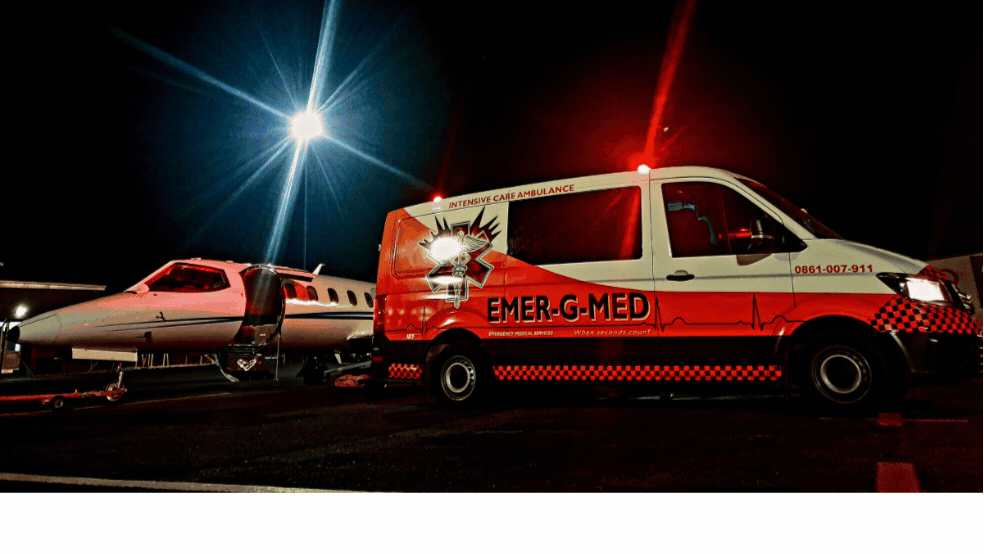From the Road to the Sky: Meet the Heroes Among Us

Paramedics. We sometimes catch a glimpse of their flashing lights on the road or see them fleetingly at an event, observing the crowds, waiting to be called upon when someone needs a medic. However, the life of a paramedic stretches far beyond being casually observed by us, and certainly beyond the road and flashing lights.
Every day, worldwide, paramedics respond to emergencies, save lives, and provide critical care in the most challenging circumstances.
In our blog this month, we sat down with two of our paramedics, Thami Cokoto and Phendukani Mdakane, to unpack the road they have taken to becoming paramedics, their experiences, and how they have taken their skills from the road to the sky.
A Journey of Dedication and Expertise
Thami Cokoto is an Emergency Care Technician with 13 years of experience in the field, eight of which he has spent providing advanced life support. Thami initially aspired to be a firefighter, which required him to complete a course in First Aid Level 3 or Basic Ambulance Assistant (BAA). He chose the latter, and it was during this training course that Thami realised his passion for the medical side of emergency services. This led him to pursue further qualifications, eventually falling in love with the process of assessing patients and improving their conditions.
Phendukani Mdakane is an Emergency Care Practitioner. Born in a rural part of South Africa, Phendukani experienced at a young age the long distances people had to travel for medical care and the lack of fast access during emergencies. This inspired him to pursue a career as a paramedic, so he could be in a position to save and help people and make a difference in their lives.
The Multifaceted Role of Paramedics
The role of a paramedic is far more complex and demanding than many realise. Thami vividly describes the unpredictable nature of the job: "Being a paramedic means you have to wake up in the middle of the night, drive to an unfamiliar place, and save the life of someone you've never met."
Beyond medical treatment, paramedics often take on multiple roles, including that of a counsellor. The therapeutic process begins the moment patients hear the sirens, signalling that help is on the way. Paramedics must calm and reassure their patients, manage their injuries, and make critical decisions about their care.
Thami and Phendukani emphasise the importance of information and confidentiality in their work. Effective patient management depends on accurate information, which is crucial for choosing suitable facilities and ensuring the correct level of care from specialists. This information also prepares other healthcare providers to continue the care initiated by the paramedics.
Finding Fulfilment in Service and Staying on Top of Your Game
When asked what they enjoy most about their jobs, both Thami and Phendukani highlight the sense of fulfilment and purpose. Both have found great satisfaction in working with a dedicated crew, who are devoted and fearless, and being able to help people in their moments of need, knowing that their presence makes a significant difference in their lives.
To handle a variety of emergencies, paramedics must stay prepared and maintain their skills through continuous education and training. Both Thami and Phendukani stress the importance of attention to detail, ongoing courses, and peer discussions to stay updated.
Being a Paramedic On Board an Air Ambulance
In preparation for taking flight, Universal Air Evac provides all medical crew an extensive orientation programme, which includes aspects such as medical equipment operation and orientation, flight physiology, crew resource management, aircraft checks and pre-flight procedures, infection control and prevention, and their CAT 138 training and exam. This covers safe air ambulance operations inside and outside the aircraft, as well as other aspects of an air ambulance mission.
CAT 138 is a prerequisite required by the South African Civil Aviation Authority (SACAA) before any crew can work on a medical aircraft and is renewed yearly.
In taking their skills to the air, the main differences lie in the process of gathering information, continuation of care, and preparedness on board the flight.
As a first responder on the ground, the paramedics gather information about the patient, which is used to determine the level of care needed. In contrast, with a medevac flight, all the information is provided to the paramedics, and their role becomes one of continuing care.
Communication also becomes vital, as the treating doctor has already determined the care required and prescribed treatment. Universal Air Evac's control centre is the heart of this communication chain. While preparations are underway, the control centre provides the paramedics with information about the patient.
"Communication is the foundation of our preparedness and continuation of care on board a flight," Thami explains. "It is the information we receive about the patient that determines the equipment we take with us on the flight. When you are on the road and there is something you need, it's easy to make a detour to pick it up. When you are in the sky, well, detours are not an option. Being a flight medic is all about preparedness."
A Call for Appreciation
Paramedics are often overlooked until someone shouts for help. But in reality, they play a critical role in the lives of the public.
Take a moment, next time you see flashing lights, to honour these everyday heroes and recognise the vital contributions they make to our communities.

